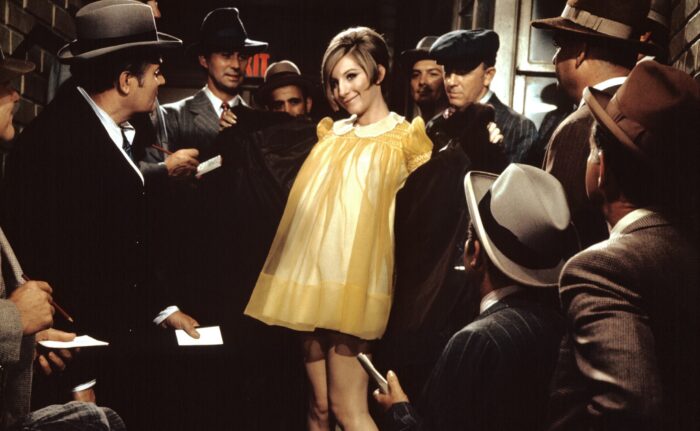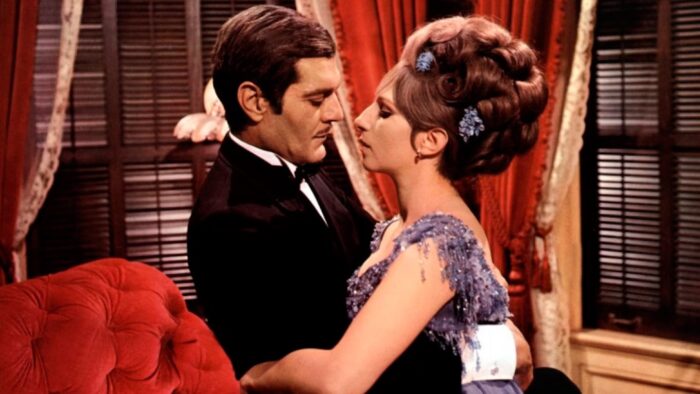
41st Academy Awards (1969)
Nominations: 8
Wins: 1
Well, we’ve got another William Wyler movie to be reviewed today, which puts him pretty far ahead as the most discussed director in Oscars Fortnight history (we also previously reviewed Wuthering Heights and Ben-Hur). I think what made Wyler such a prolific Oscar-friendly director is that he was able to adapt his style of prestige-laden elegance to other styles of crowd-pleasing entertainment as the decades went on, like the ancient epics of the ’50s or in this case, the excessive pre-New Hollywood musicals of the ’60s. Wyler’s movies have never been cool, which is perhaps why he’s never talked about anymore as one of the greats, but honestly, I think I’ve still yet to see a movie of his I didn’t like, so it’s hard to say his Oscar glory was unearned.
Funny Girl was a bit of a left turn in Wyler’s waning career because despite working in the film industry since the 1920s, it was the first time he had directed a musical. The stage production of Funny Girl had become a star-making performance for Barbra Streisand, and while other actresses were considered for the role (most notably Shirly MacLaine), producer Ray Stark wouldn’t allow the film to get made unless Streisand starred in the film adaptation. This turned out to be the right choice, as the film also became Babs’s star-making film performance, earning her a Best Actress Oscar in the only time there’s ever been a tie for that category (she earned the same amount of votes as Katherine Hepburn for The Lion In Winter).
If all of that context wasn’t enough, another thing that’s a little hard to keep in perspective while watching Funny Girl is that it’s loosely based on the life of Broadway star Fanny Brice. However, I can only really speak for the Fanny that we see in this film played by Miss Streisand. In the film’s opening moments, we see her walk into an empty theater and whisper the immortal words “Hello, gorgeous” before we flashback to a younger Fanny trying to make it as a chorus girl in New York City in the ’20s (I seem unable to escape the flapper era this year). Fanny is a bit of an awkward Jewish girl from the Lower East Side, but she’s got plenty of wisecracks and a certain panache that catches the eye of the famed Broadway impresario Florenz Ziegfield (played by Walter Pidgeon).
Fanny ends up performing in many of Ziegfield’s shows and while she’s insecure about her looks, she manages to carve out her own niche in these reviews with her own distinct wit. After one particularly memorable performance where Fanny upsets Ziegfield by dressing up as a pregnant bride, a charming businessman and gambler named Nicky Arnstein (Omar Sharif) comes backstage to congratulate Fanny on the performance. As Fanny becomes a bigger star, her and Nicky keep running into each other and eventually fall in love and get married. In the process, Fanny embraces Nicky’s glamorous lifestyle while straying considerably from her working-class roots. While the bonds of their affection seems to deepen over the years, Nicky’s lifestyle catches up with him as he’s faced with criminal charges for embezzlement and is sent to prison, but for Fanny, the show must inevitably go on.
Funny Girl is a film I’m not sure I have too much to say about, just because it’s such a sturdy movie musical, not really reinventing the wheel in any way, but also sumptuous enough and pleasing to look at that it’s hard not to be charmed. The most remarkable thing about it certainly has to be Streisand’s performance, where she feels like she’s having a real A Star Is Born moment — being at the center of a story about becoming a star while showing that she herself deserves to be a star. And even though she’s embodying the story of another New York theater legend, this story of an unconventional girl from the neighborhood making it on Broadway feels about perfect for her as a breakout role.
As an adaptation of a somewhat established musical, Funny Girl does a pretty good job of opening up the world of the stage production to feel like it exists in the world of The Roaring Twenties, but also feels like a faithful recreation. The songs and the performances are still the focal point here, and there are a few pretty iconic songs here, like “People” and “Don’t Rain On My Parade”. I think the only thing that keeps this from being a truly stand-out musical for me is that the story itself doesn’t contain too much to separate it from a lot of other musicals about Broadway and turbulent romances. But everyone loves to see a major talent announce itself, and by doing it with a heated bout with Oscar heavyweight Katherine Hepburn, it’s hard not to be impressed with the way Babs didn’t let Kate rain on her parade.


